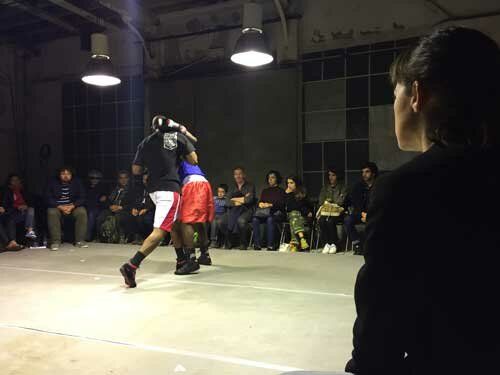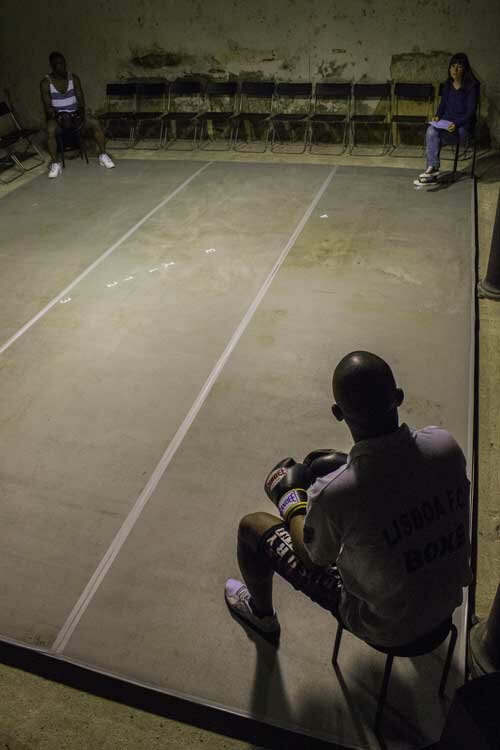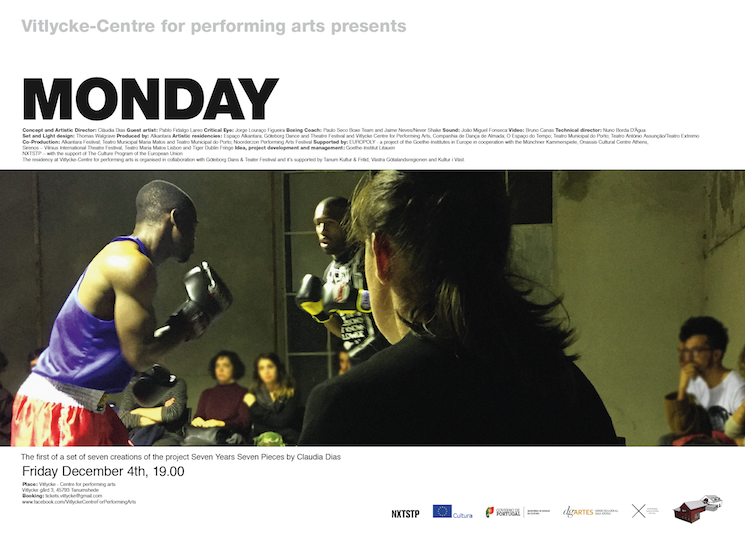Concept and artistic director: Cláudia Dias Guest artist: Pablo Fidalgo Lareo Critical Eye: Jorge Louraço Boxing Coach: Paulo Seco Boxe Team Sound: João Miguel Fonseca Video: Bruno Canas Technical director: Nuno Borda D’Água Set and Light design: Thomas Walgrave Produced by: Alkantara
Artistic residencies: Espaço Alkantara; Göteborg Dance and Theatre Festival and Vitlycke – Centre for Performing Arts, Companhia de Dança de Almada; O Espaço do Tempo; Teatro Municipal do Porto. Co-Production: Alkantara Festival; Teatro Municipal Maria Matos and Teatro Municipal do Porto
Supported by: EUROPOLY – a project of the Goethe-Institutes in Europe in cooperation with the Münchner Kammerspiele, Onassis Cultural Centre Athens, Sirenos – Vilnius International Theatre Festival, Teatro Maria Matos Lisbon and Tiger Dublin Fringe. Idea, project development and management: Goethe-Institut Litauen
NXTSTP – WITH THE SUPPORT OF THE CULTURE PROGRAM OF THE EUROPEAN UNION
23.11 - 05.12
Residency supported by Göteborgs Dans & Teater Festival, in collaboration with Vitlycke Centre For Performing Arts, within NXTSTP – with the support of the Culture Program of the European Union.
“Monday is the first of a set of seven creations of the project Seven Years Seven Pieces. This project is based on the idea of the meeting between two people, myself and a guest artist. In this first creation, the guest artist is Pablo Fidalgo Lareo, with whom I share an historic and cultural background but not necessarily the same way of seeing the world. Thus, Monday is a meeting where con-flict is not only present but also constitutes the generator of new ideas. The piece is structured in a boxing match – 12 rounds where words and bodies collide.” Cláudia Dias
OK, KNOCK ME OUT (Monday)
When we take a punch, at least something happens. With any luck, we are conscious of the act and know that it’s happening. Knowing anything at all when we are being pounded in the face is a good first step, but it’s better to also know who, how, why, and what.
In a world of more or less dissimulated aggression at home and at work, and more or less simulated aggression in leisure, it is to be expected that sooner or later someone will start throwing punches. At least metaphorically. What is surprising is that so many people take the hit without knowing why.
Before allowing someone to slug us, for lack of warning, it is a good idea to keep the consequences of the act in mind. Not knowing the motivation and finality of that act is missing the point, no matter how square the punch lands. If the act is unfamiliar then a conflict can become nothing, even after it has happened. What then? Compared with the before and after, nothing. But by evaluating the act, before and after impact, we can edify time itself, history, and our memory of the future.
Not being afraid. Not being afraid of everything. Not allowing fear to have everything. Not building the Portugal of the future on a foundation of fear.
Personal arenas
In the next seven years, Claúdia Dias has proposed to create a cycle of seven pieces with seven handpicked partners. This first part, like the others, will be a fourhanded endeavor. However, with Pablo Fidalgo, the meaning is literal: their hands, flesh and bone, are center stage. Cláudia and Pablo reconstruct a boxing match, fists clenched, one against the other. Judging from the rehearsals, regardless of whether it’s full contact boxing or a free-for-all, one thing is certain: they’re going for the mouth – no point in shying away from the words – literally and metaphorically.
The mat gives way to metaphor. The fight has several blocks of more or less 30 questions about distance and proximity, complicity, intimacy, and difference; about why things are the way they are, why we are the way we are. In total, there are more than 200 questions, played live. Each question is a hook or uppercut; words that name parts of combat and that can lead to a KO. OK.
The questions begin with our fear of others and proceed to our fears and desires for the future, noticeable even in the small things that have domesticated us, from the point-of-no-return of adolescence to our grand entrance into adulthood (with promises of emancipation and all). The question is always the same: how can we talk to others? (Assuming we wish to talk to them at all.) How can we come closer to others? What language? (Theirs?) What intimacy, what family, what community is this? European? Only allegorically. But it is only a short step to rethinking our capacity to make a revolution, even if only allegorical, with its irreversible acts: the death of others or our own.
The show isn’t ready yet, but one thing seems certain: it will be both direct and personal and very metaphorical and political. The themes arrange themselves – brought about by the questions – in the many rounds of the piece, until the limit of language is exposed. A point is reached in which words are no longer able to account for what happens. The separation between mind and body, and reason and emotion that limits our practices becomes the topic and form of the performance. That is why “getting punched in the mouth” is so appropriate. The mouth performs most of the language on stage, after all. And that is why this performance is a sort of allegory of a possible Europe, built on the minimalistic metaphor of hands and mouths, represented by literal hands and mouths.
In the end, the contents of the performance are those of the everyday life of Europeans. They reveal the irresolvable contradiction of being an inhabitant of Europe today: discourse says one thing, and practice, another. Or still: discourse does one thing and practice, another. Who dominates our bodies, who is their master? Who colonizes us and who do we colonize? What is the strategy of the weak before the strong? What do we know? What do we need to know to act? Act against whom? Who is the real enemy? Our neighbor? A stranger? Our enemy’s friend? Is it us, each one of us? When do we enter the ring? When is it our turn?
Cláudia and Pablo take hits to the mouth, literally and metaphorically. They are part of a community that has fallen to the mat many times, a defeated generation, a prostrated country, a bankrupt state, a failed union, a devastated peninsula, a lost continent. There is no shortage of adjectives. As they pummel each other with arguments, there will be light, like in fables, between the promised blood, sweat, and tears. The feeling of oppression gives way to a feeling of solidarity between peers, reinforced in combat as they recognize themselves as equals. Fists clenched. Contrary forces producing enough friction to move from words to action.
European rings
It’s the fight of the century, in the Tagus estuary, to the glee of Europe. Twelve rounds of questions that remain to be answered – or maybe not, if we allow the audience members to resolve them. It’s the last word on where we are and where we are going. Looking at the strength of Pablo’s arms and Cláudia’s footwork, there are few certainties about who will win. How much will you wager? The most likely outcome is a tie, like in a Beckettian chess game, rather than a Brechtian mano-a-mano. Do you want to bet?
The first version of the duel between Pablo and Cláudia was rehearsed before an audience held in suspense last May, in an improvised boxing ring at Espaço Alkantara. Each round of questions between Pablo and Cláudia was followed by a round between two boxers of African origin, black like in the movies. The confrontation between europes was there, in the flesh, not just between whites and blacks, rich and poor, men and women, intellectuals and blue-collar workers, the Portuguese and the Spanish, but above all between spirit and matter, the false opposition that must be resolved. When will we begin to speak of ourselves in the plural? Who are we against? Who is the other? The two artists’ invectives will not fall
on deaf ears, because they are filled with hope for each of the minutes that is yet to be. (In seven years, there are millions.)
The piece is only language, of course, but even then it also consists of the raw material (and work) that is the performers, addressing an unpredictable audience, no matter how prepared they may be. The piece is not limited to its themes and sources. The elements that make up the work – perhaps it would be better to say experience rather than work – do not in themselves exhaust the experience. The structure of the event, prepared to happen live, also matters. For part of it, the authors on stage reconstruct forms of encounter with patent interrogations and latent affirmations, in the text and in their bodies. Pablo and Cláudia are two singular spirits – or should I say materials? Their confrontation generates innumerable possibilities for alliance. The gesture of combat, common to both, constitutes the proof, cause, and effect of a collective impasse on the brink of collapse. These are the stakes for the fight of the century.
Jorge Louraço Figueira
CV CLÁUDIA DIAS
Cláudia Dias was born in Lisbon in 1972. She is a choreographer, performer, and teacher. She is currently completing her Master’s degree in Performing Arts at Universidade Nova de Lisboa.
She began her dance training at Academia Almadense and received a schol-arship to continue her training with Companhia de Dança de Lisboa. She completed the training program for Contemporary Dance performers at Fórum Dança and the Professional Course in Management of Cultural Orga-nizations and Projects organized by Cultideias.
She began working as a performer with Grupo de Dança de Almada. She was part of the artists’ collective Ninho de Víboras. She collaborated with Re.Al and was a key performer in João Fiadeiro’s work and in the develop-ment, systematization, and transmission of the technique of Real-time Composition.
Dias created the following pieces: One Woman Show, Visita Guiada, Das coisas nascem coisas, Vontade De Ter Vontade, and Nem tudo o que dize-mos tem de ser feito nem tudo o que fazemos tem de ser dito.
She developed the educational project Nesta Parte Esquinada da Península with Azala, Muelle 3, La Fundición, and Festival BAD.
Since 2007, she regularly teaches workshops in Choreographic Composition and Real-time Composition.
Her work as a choreographer, performer, and teacher has been presented by many organizations, theaters, and festivals in Portugal and abroad.


